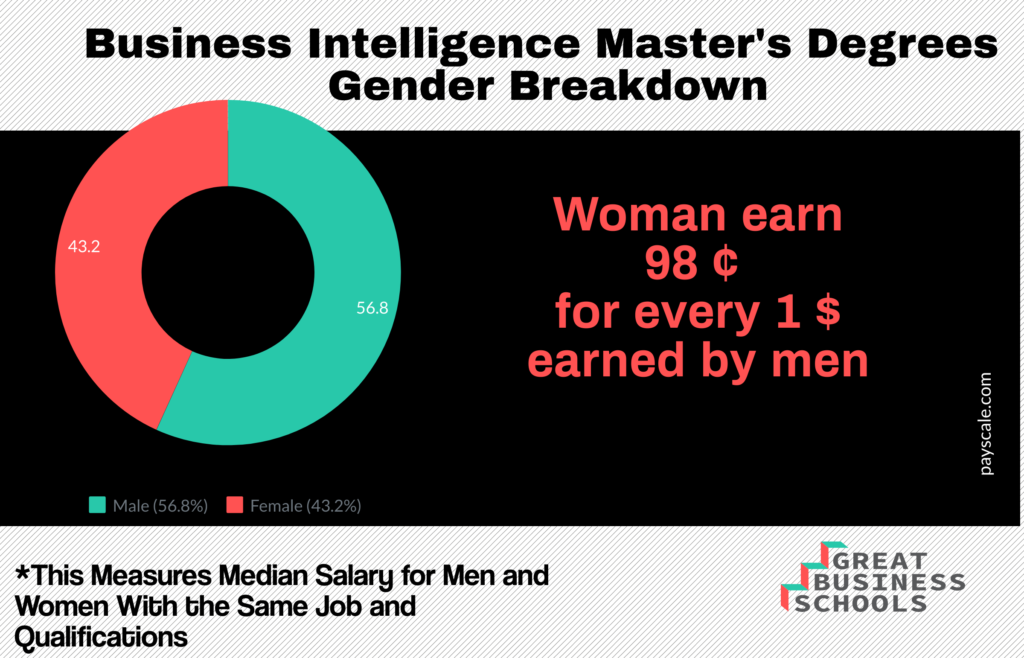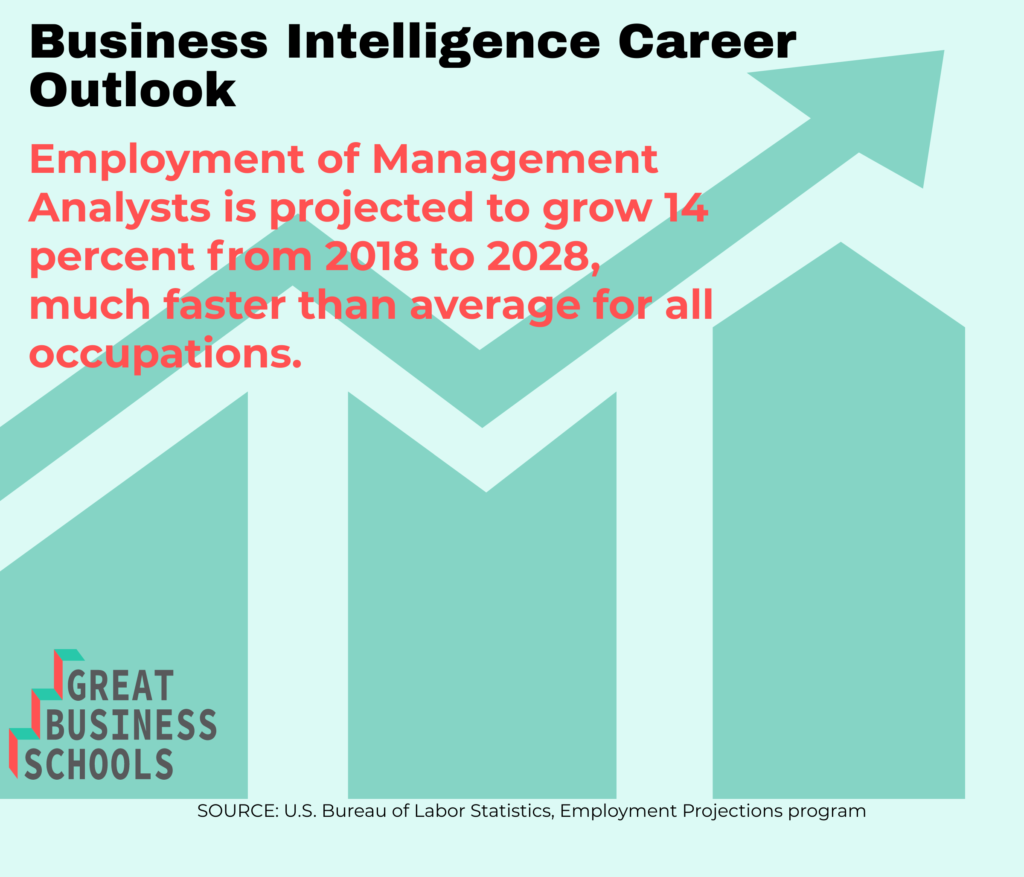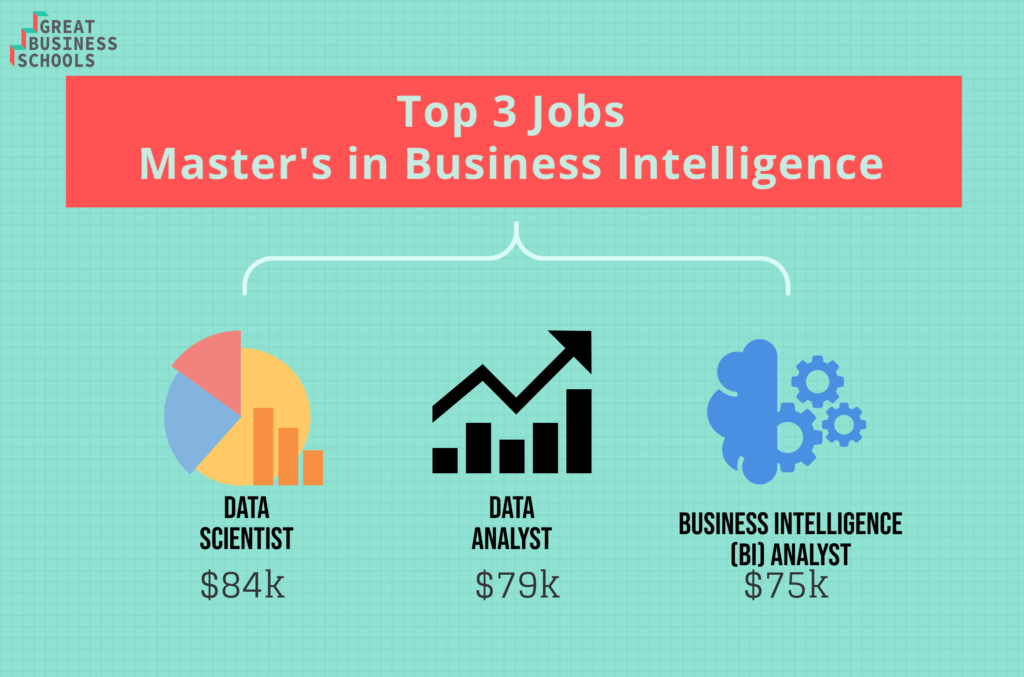It’s not uncommon for prospective students to become curious about different opportunities in the business field. A query that may come up is “What is business intelligence?” Business intelligence is a type of analyst career path. Business intelligence means the professional is equipped to take data and analyzed it in a way to benefit the business. Business intelligence at a master’s level will delve into the field in depth. The graduate will be prepared to work as an analyst, developer, project manager, director, and consultant. Oftentimes, a career in business intelligence is pursued at the mid-point in a career. The business intelligence analyst may have already gained experience in fields such as finance, accounting, computer science, or economics.
Before pursuing a masters in business intelligence, these are frequently asked questions of students:
What is analytics and business intelligence?
Analytics and business intelligence are closely related. Many times, the official title of the professional will be business intelligence analyst. The specialist will be comfortable around data set and familiar with the significance of big data. Big data refers to the ability to work with large data sets and analyze them to gain insights. Business intelligence analysts are expected to pass along insights to internal departments to guide their decisions. The analyst may recommend solutions based on the data or leave it up to each individual department on how to perceive the data. The analyst will also have a high comfort level working with common software programs and applications used in the field of data analytics. Those with a computer science background could work in development and create new business intelligence solutions based on client need.

What skills are needed for a career in business intelligence?
Analytics is a big part of a business intelligence career. Any type of job related to business intelligence requires analytical skills. The person can sort through data sets and interpret the collected information into terms that colleagues will understand. Due to the sensitive nature of the job, a business intelligence professional must be able to pay close attention to detail. Along with factual analysis, the employee would need superior communication skills. Once data is analyzed, the professional must be able to report the information in written or oral format. According to CIO, business intelligence boils down to translating raw data into actionable insights. Business intelligence removes the technical aspect of interpreting data to allow leveraging among managers. For business intelligence, the professional must also have a comfort with working both individually and as a team. Some data analyses are solo endeavors while others require a team effort.
What type of advanced positions are available in business intelligence?
Throughout a person’s career, even when seeking out advancement opportunities, data will be a part of any business intelligence profession. For instance, an analyst may become promoted to project manager. A business intelligence project manager oversees the collection and analysis of data sets and searches for improved methods using within the business intelligence department. Project managers can advance into director positions or even aim for a role within the top executive branch of the organizations.
Where are business intelligence jobs found?
Business intelligence provides the flexibility to work within a firm or on a consulting basis. Consultants can be hired by firms to analyze the efficiency of the organization. Based on data collected, solutions can be offered to improve the organizational goals. Business intelligence consultants have the skillset to analyze key financial data such as payroll figures, expenditures, and revenue. Scientific firms, technical organizations, government offices, research institutes, and private companies will all have open placements for those with a masters degree in business intelligence.
What type of degree is needed for business intelligence jobs?
Business intelligence careers offer good prospects when a relevant college degree is possessed. Positions can be secured with a bachelor degree, but many companies prefer those who have a masters degree. It’s not uncommon for the applicant to have a MBA with a specialization in business intelligence. Certifications also help prospective employees gain a permanent business intelligence position. Business intelligence can be a field entered after working at an entry-level analyst or accounting position. After five years of corporate experience, the analyst may choose to enroll in an online masters degree in business intelligence.
Accreditation for Business Intelligence and Analytics
School accreditation is extremely important for degree seekers. Without accreditation, a degree can be considered seemingly worthless. Due to a surge in falsified degrees, employers are now diligent about confirming that any type of degree program has been properly accredited. A master’s degree program in the field of business intelligence should have regional accreditation. Regional accreditation occurs when a local accrediting agency reviews the program and college’s credentials.
The accrediting board checks a few key features about the college and degree prior to awarding accreditation. The curriculum will be the main aspect reviewed by the accrediting agency. The school and program will be re-evaluated on a routine basis to confirm that standards are still being met. The goal of any degree program is to provide the high level of skill needed for success in the field. Accrediting agencies look at program outcomes and faculty’s backgrounds too before offering accreditation. Although national accreditation is available, this type of accreditation usually applies to trade schools. Any type of business school with a masters in business intelligence should have regional accreditation.
According to the Council for Higher Education Accreditation, each state in the nation is assigned to a specific regional accrediting commission. For instance, the New England Commission of Higher Education is in charge of accrediting colleges in the following states: Connecticut, Maine, Massachusetts, Vermont, New Hampshire, and Rhode Island. Regional accreditation is considered the gold standard in education. Regional accreditation is normally a requirement to receive any type of federal loan or grant money. Furthermore, most colleges ask for regional accreditation before accepting transfer credits.
Any type of business degree, like business intelligence, should also be accredited by a specialized organization. Professional business organizations are enlisted by colleges and universities to review their current degree offerings. For business intelligence, there are several agencies that review masters degree programs. First, the AACSB is a non-profit organization that has accredited more than 840 business schools, including those with business intelligence degrees, around the world. The agency offers two types of accreditation: Business and Accounting. The school must abide by all 15 of the agency’s standards to receive accreditation. Another type of agency is the ACBSP. The ACBSP has accredited over 1,000 business degree programs offered at global colleges. The goal of ACBSP is to accredit all business degrees to confirm the highest level of standards of workers in the field.

Types of Business Intelligence Degrees
A masters in business intelligence positions the student to secure a high-level analyst position. Before entering a master in business intelligence and analytics degree track, the students should have some sort of corporate background. The prospective degree holder may have an undergraduate degree in accounting, economics, and finance. Since business intelligence careers are not usually entry-level, the profession may be at the mid-point of his or her career with at least five years of post-collegiate work experience. In this case, an online masters in business intelligence may make the most sense.
With a masters in business intelligence online, the student is able to take classes while still working. The courses can be finished along with meeting job and family obligations. A master in business intelligence online degree promises no income disruption. The student will simply complete courses during the evenings or weekends until degree requirements are met. Costs are reduced too for an online masters in business intelligence. Online classes may have a lower tuition rate than in-person classes.
Business intelligence degrees will normally ask for the student to choose a concentration. Operations is one example of a concentration in business intelligence. Those who choose this concentration often look for careers in the manufacturing field. The student will be well-versed in confirming that manufacturing processes are efficient and within budget. Accounting is another popular concentration for business intelligence degree seekers. With accounting as the concentration, the business intelligence analyst will possess a superior knowledge of financial data collection, recordkeeping, and tax regulations.
Software development is another example of a business intelligence concentration for masters degree seekers. After analyzing data, the business intelligence developer will have the capacity to come up with solutions for clients. During coursework for business intelligence and software development, the student will gain a comfort level working with Oracle, DB2, and SQL.
A masters in business intelligence can also usually be earned as a specialization option within another degree track. In many cases, the masters degree program will be for a MBA or masters in business administration. The student can then choose the business intelligence specialization. Within the specialized courses, students will learn about data collection and analytical tools. Software programs are covered during coursework as well as data modeling and database concepts. The masters in business intelligence courses will also delve into managerial concepts for data analytics.
Computer information systems is another major that offers business intelligence as a specialization. Within this type of track, the student attends courses related to advanced data analytics, data warehousing, social media insights and tracking, and trading strategies.
A masters in business intelligence online is synonymous with a major in data science. In this case, the student may have a major called Master of Data Science, Master of Business Analytics, or Master of Information and Data Science. These programs are available online and can be done in an abbreviated timeframe. In some cases, you could earn your online masters in business intelligence in as little as 12 months. Topics within the program will include cybersecurity, predicative analysis, manager concepts and applications, financial analytics, and business technology. Requirements for acceptance into a masters in business intelligence online will include an undergraduate degree from an accredited university. GRE or GMAT scores may be waived depending on your past work experience in the corporate field. Those who have at least two years of relevant business intelligence experience may be considered exempt from the GRE or GMAT.
Credit minimums for graduation with a business intelligence degree varies from school to school. In the majority of programs, the student will need to finish between 36 and 54 semester hours before degree conferment. This will amount to around 12 to 18 graduate-level courses. Semesters at online schools are often accelerated with courses finished in six- to eight-week intervals. Some online colleges allow the student the option to complete the business intelligence courses self-paced.
Certifications in Business Intelligence and Analytics
Business intelligence certificates are extremely important in the field. Although a degree is needed to secure a position, the business intelligence certificate demonstrates your specialized knowledge. An online certificate in business intelligence can be arranged through professional organizations and accredited business schools. The following are a few of the top business intelligence certificates:
The Certified Business Intelligence Professional is the most common of all business intelligence certifications. There are multiple levels available within the certification program including associate and mastery. Three 90-minute exams are required that extensively cover data integration, business analytics, data analysis and design, and business leadership. Most of the certified professionals have more than 10 years of business intelligence experience.
Microsoft offers BI Reporting, a type of specialized business intelligence certification program. The program covers transforming data, modeling, finding and organizing data sources, and dashboards. The program also covers connectivity with Microsoft products such as Excel and Powerpoint.
SAS BI Content Developer is a certification program for those who are involved in information management and business intelligence. The certification program covers the skills needed for data management through the SAS BI Dashboard. The SAS BI Dashboard is a frequent tool used by business intelligence analysts.
The Bureau of Labor Statistics recommends Certified Management Consultant to those looking to improve job prospects. With the CMC, the professional will have at least three years of consultancy experience in the field of business intelligence. A four-year undergraduate degree is needed along with a minimum of five professional references. Written and oral examinations are required to obtain the highly-selective certification.
For most positions, a license will not be a must for a career in business intelligence. However, if the professional is working as an accountant with a specialization in business intelligence, he or she may be licensed as a CPA. A CPA license is needed to practice as an accountant nationwide. To receive the license, accounting and business courses must be completed. An extensive CPA examination will also be given prior to receiving a license.

Careers in Business Intelligence
Business intelligence jobs are diverse. However, when someone is looking on how to get a job in business intelligence, he or she is likely to look at analyst positions. Analyst jobs in business intelligence involve examining and analyzing data sets. An analyst will also be expected to develop algorithms. Databases will need to be monitored and updated by analysts on a business intelligence team.
Business intelligence analyst jobs may also include project management. Project managers head up key tasks for an organization and oversees all other members of the team. A business intelligence project manager is likely to finalize reports and make recommendations based on results. A director of business intelligence is another job title and refers to a leader in the department. The director will research data solutions, train staff members on how to use these tools, and handle personnel decisions for the department. Business intelligence majors are well prepared to lead within a corporation. The business intelligence background allows for the person to be well equipped to make key budget and operations decisions. It is not uncommon for a CEO or CFO to have a background in business intelligence.
Business intelligence developers will operate with specialized software. The developers look to provide solutions for improved data management and data integration. Business intelligence developers understand the top software solutions for big data purposes. Business intelligence engineers have a similar role and work on the more technical side of the profession. The engineer is hyper focused on the development and implementation of tools to capture data and analyze it into meaningful insights. Computer science and business intelligence careers often have a lot in common. Networks and systems will be analyzed and finetuned by those in this type of field.
Data analysts for a healthcare agency is another potential job in the field of business intelligence. Healthcare careers are on the rise and the medical industry needs professionals to make data collection manageable. Healthcare agencies want the ability to analyze large data sets quickly and leverage the information collected. Analysts aim to help healthcare staff improve patient outcomes while making operations run efficiently.
Another potential pathway is forensic accounting. Forensic accountants are often professionals who have majored in accounting and business intelligence. Forensic accountants don’t only need financial prowess, but also superior investigative skills. Forensic accountants must research data to find any discrepancies for litigation purposes.
Business intelligence career paths may also include working as a consultant. Consultants in the field are typically hired by an outside agency. The business intelligence consultant will analyze different facets of the organization. Once all records are reviewed, the consultant makes improvement recommendations. Government offices are often in need of both business analysts and consultants. The business intelligence consultant will be hired to look at how the office is doing as far as expenditures, employee retention, and revenue. Consultants may also work with private clients. Since the consultant has a background in analyzing financial figures, he or she is qualified to make recommendations on how clients should handle their money.
Another potential career path in business intelligence is research. Researchers are hired to collect and study data in a controlled environment. Researchers check for more efficient ways to mine and analyze data sets. Researchers are hired with a masters degree in business intelligence, but may choose to advance their careers with a doctoral degree. Research at the doctoral level will often be published in scientific journals.
Business Intelligence Salary Potential
Business intelligence analyst salaries are very competitive. A salary for business intelligence analyst is high due to the STEM skills required for job success. According to the Bureau of Labor Statistics, the average analyst salary is more than $85,000 per year. Growth is exceptional in the field with a projected rate of 16 percent over the next decade. This is a much higher rate than the national average of all other professions. There is a high demand for professionals in the field because the goal of a business intelligence analyst is to lower overhead costs, improve efficiency, and increase revenue.

Average salaries are highest for business intelligence analysts in the technical industry. Workers in this area make upwards of $91,000 per year. In comparison, government analysts average around $79,000 annually. Self-employed consultants don’t make a salary and instead are paid on a per project basis. Any type of management or director positions within a business intelligence department will earn a higher salary. Top earners in the field of business intelligence analysis make more than $154,000.
The top paying states for business intelligence analysts are New York, Massachusetts, District of Columbia, and New Jersey. The annual mean wage for analysts in these states exceed $106,000 per year. Top paying metropolitan areas for analysts include San Jose, New York, and Bridgeport.
Due to the highly technical nature of the job, business intelligence developers and engineers typically make much more than analysts. On average, these positions pay in excess of $99,000 per year.
Professional Organizations in Business Intelligence
Professional organizations are a good idea for anyone in the field of business intelligence. When a person joins a professional organization, he or she is instantly connected with others in the industry. Professional organizations provide corporate publications, training opportunities, networking events, and continuing education credits. Professional organizations will also usually be in charge of certification programs. To get involved with a professional organization, members are usually asked to pay a small yearly fee. The following are the top professional organizations for business intelligence employees and managers:
- The International Institute of Business Analysis
- American Association for Budget and Program Analysis
- Association for Financial Professionals
Carrie Morris
Author
Warren Dahl
Editor-in-Chief

